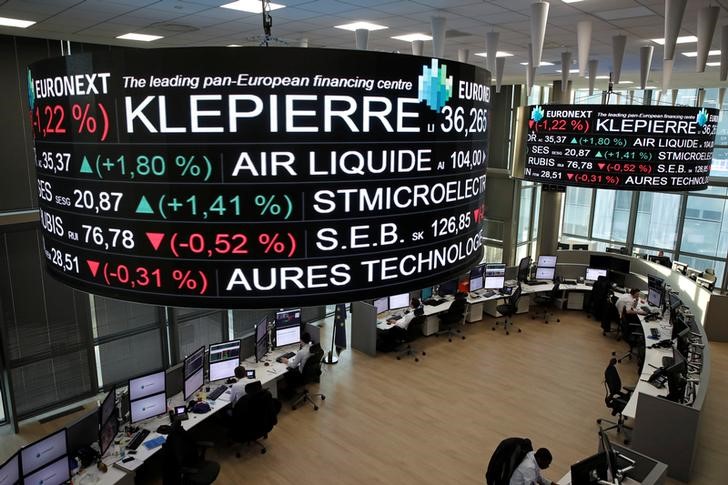BofA warns Fed risks policy mistake with early rate cuts
Investing.com - European stocks fell Friday as investors digested U.S. President Donald Trump’s fresh levies on imports from dozens of countries as well as more corporate earnings, ahead of the release of key regional inflation data and the widely-watched monthly U.S. jobs report.
At 03:05 ET (07:05 GMT), the DAX index in Germany dropped 1.3%, the CAC 40 in France slipped 1.2% and the FTSE 100 in the U.K. fell 0.6%.
More Trump tariffs
Trump signed an order late Thursday slapping fresh levies on imports from dozens of countries as the deadline to agree a deal with his administration ran out.
Rates were set at 39% for Switzerland, 35% for Canada, 25% for India, 20% for Taiwan and 19% for Thailand, for example, while Trump also warned that any goods considered to be transshipped to avoid U.S. tariffs will be subject to an additional 40% levy.
This news has hit sentiment Friday, but losses are still relatively minor when compared with the dramatic selloff seen in April after Trump first disrupted global trade with the threat of tariffs.
Most levies are lower than those threatened on April 2, plus deals have already been reached with the likes of the European Union and Japan while talks with China and Mexico are still ongoing.
Eurozone CPI precedes U.S. payrolls
Investors are also keeping some of their powder dry ahead of the release of the eurozone flash CPI later in the session, as they seek more guidance of the likely path of regional interest rates as the year progresses.
The consumer price index is expected to show a slight easing to 1.9% in July from 2.0% in annual terms.
The European Central Bank held rates steady at 2% last week – having cut its policy rate eight times since June 2024 – and offered a modestly upbeat assessment of the eurozone economy, raising doubts among investors about further policy easing.
Across the pond in Washington, eyes will be on the monthly jobs report, which could be pivotal for hopes for a rate cut from the Federal Reserve in September.
Nonfarm payrolls are expected to have climbed 107,000 rise in July, below the 147,000 in the prior month, while the jobless rate likely ticked up to 4.2% from 4.1%.
The Federal Reserve maintained interest rates at current levels on Wednesday, but two governors called for lower rates, dissenting for the first time in more than three decades.
Earnings season continues
There are more second-quarter earnings for investors to wade through Friday, with the results season approximately halfway through.
Daimler (OTC:MBGAF) Truck (ETR:DTGGe) cut its full-year guidance after the commercial vehicle manufacturer’s second-quarter net profit dropped 61% year-on-year, weighed by restructuring costs and a non-cash impairment tied to electric vehicle development delays.
AXA (EPA:AXAF) posted a 6% increase in underlying earnings for the first half of 2025, with the French insurer’s results supported by higher premiums across its core businesses.
French IT company Atos (EPA:ATOS) reported a drop in both revenue and orders for the first half of the year, citing weak commercial activity in France and a difficult market backdrop.
International Airlines Group (LON:ICAG) reported stronger than expected numbers for the second quarter as travelers piled into the British Airways owner’s transatlantic routes at the start of the summer.
Euronext (EPA:ENX) reported strong quarterly earnings expectations, with the exchange operator’s revenue hitting a fresh record and net profit rising by almost 30%, boosted by ongoing market volatility.
On Wall Street, Apple (NASDAQ:AAPL) forecast revenue for the current quarter ending in September well above expectations, prompting premarket gains despite a warning from CEO Tim Cook that U.S. tariffs would add $1.1 billion in costs over the period.
Amazon’s (NASDAQ:AMZN) shares, on the other hand, fell sharply after the online retail giant delivered an upbeat outlook for third-quarter sales, but missed expectations for its cloud computing unit, after its competitors easily beat forecasts.
Crude steadies after imposition of new tariffs
Oil prices steadied Friday as traders digested the likely impact of new higher tariffs on economic growth at the end of a positive week.
At 03:05 ET, Brent futures slipped 0.1% to $71.68 a barrel, and U.S. West Texas Intermediate crude futures fell 0.1% to $69.21 a barrel.
Both benchmarks retreated around 1% higher on Thursday following the imposition of new, and mostly higher, tariff rates on a number of U.S. trading partners, including Canada, India and Taiwan, that failed to reach trade deals by Trump’s deadline of August 1.
However, both contracts are set to register gains of around 5% this week after Trump earlier this week threatened to place tariffs on buyers of Russian crude, particularly China and India, to coax Russia into halting its war against Ukraine.
